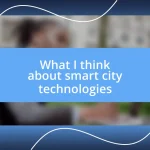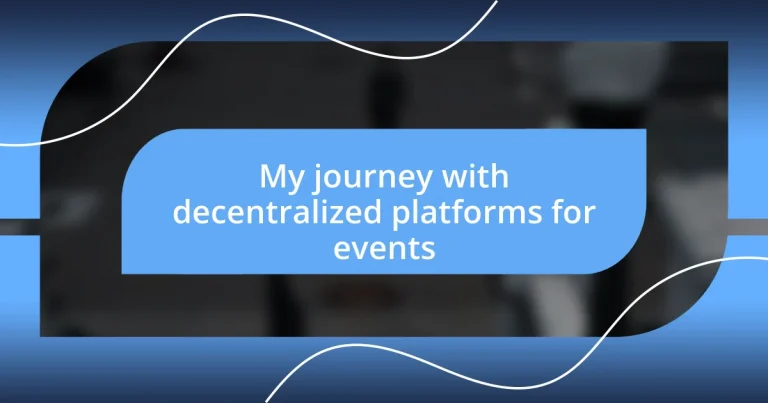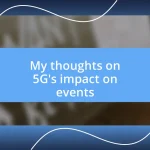Key takeaways:
- The author reflects on their first experience with decentralized platforms, highlighting the empowerment and sense of community fostered by collaborative decision-making in event organization.
- Decentralized platforms enhance transparency, accessibility, and participant engagement while also presenting challenges like regulatory issues and varying digital literacy among attendees.
- Future trends in decentralized events include personalized experiences, immersive technologies, and increased cross-border collaboration, promising a richer and more inclusive event experience.
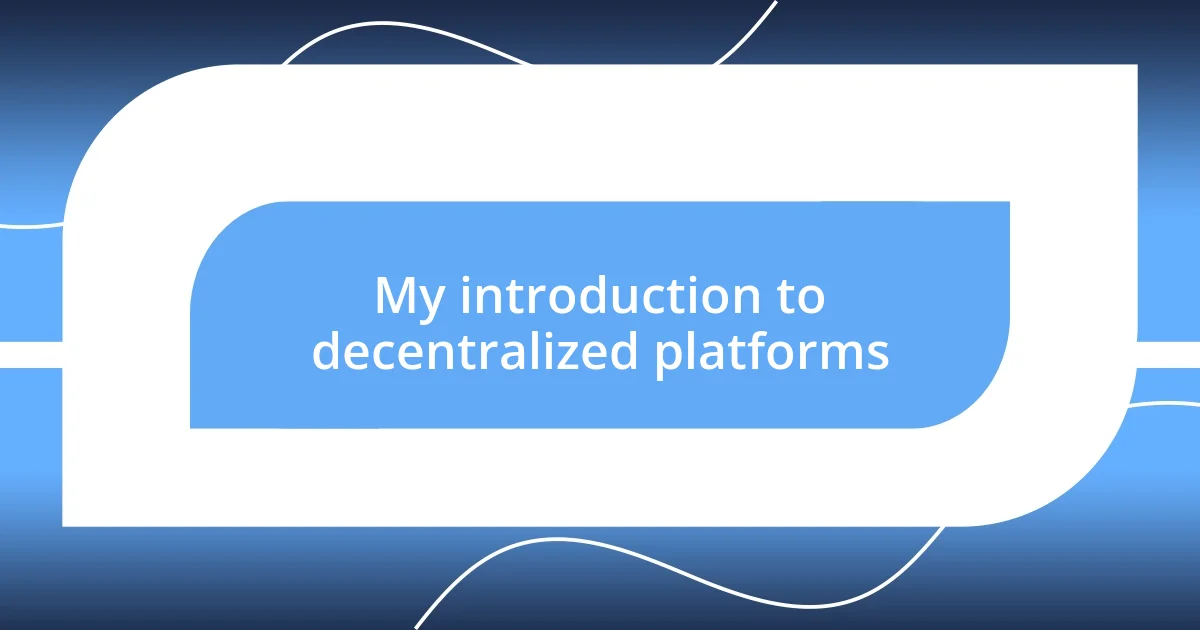
My introduction to decentralized platforms
I still remember the first time I stumbled upon a decentralized platform while searching for a more transparent way to organize events. It felt like a revelation—no central authority controlling everything, just a group of people working together. This idea sparked something deep within me; it was as if the walls that traditionally boxed me in were suddenly crumbling down.
As I explored further, I found myself captivated by the concept of trustless interactions. I thought, “How incredible to engage with others without needing to place blind faith in a single entity!” This realization opened a floodgate of possibilities and made me eager to dive deeper into how these platforms could revolutionize the way we connect and collaborate.
My first experience using a decentralized platform was at a small gathering where the organizers had embraced this new technology. I was taken aback by the ease of access and the sense of community that flourished there. It was refreshing to see my peers actively participating in decision-making, and it made me question—why had I not encountered something like this earlier? The energy was palpable, a true testament to the power of collaboration on decentralized platforms.
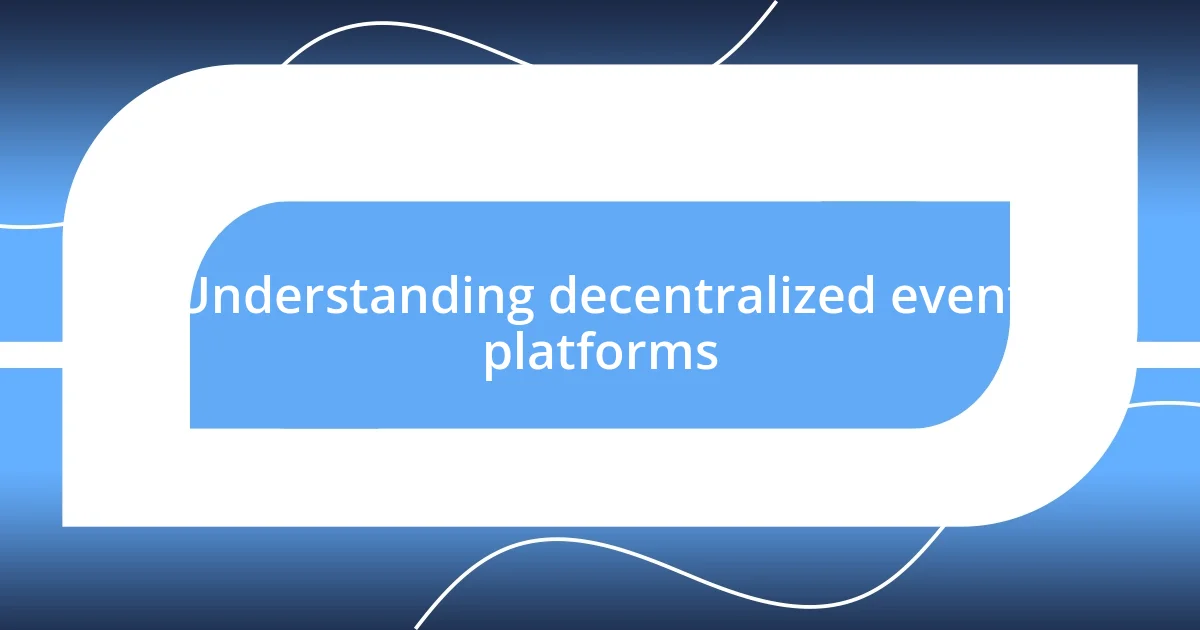
Understanding decentralized event platforms
Understanding decentralized event platforms goes beyond mere technology; it’s about reshaping our connections with one another. I’ve come to realize that these platforms leverage blockchain technology, creating secure, transparent systems for organizing events. This means that trust is built through consensus, rather than relying solely on a centralized authority. I vividly remember the sense of empowerment I felt when attending an event where the community decided on the venue and agenda collaboratively.
The flexibility of decentralized platforms allows for a variety of event types, ranging from small community gatherings to larger festivals. I once participated in a workshop organized through a decentralized platform that facilitated fair ticket pricing, ensuring that participants from all backgrounds could join without financial barriers. This kind of inclusivity truly struck a chord with me; it felt like we were all stakeholders in an experience, not just passive attendees.
Decentralization, by its nature, encourages active participation. I’ve seen how this leads to richer discussions and a more vibrant atmosphere at events. Each person’s voice is amplified, making the events not just gatherings, but co-created experiences. In my view, this evolution in event organization not only enhances engagement but also cultivates a deeper sense of belonging among participants.
| Feature | Traditional Platforms | Decentralized Platforms |
|---|---|---|
| Control | Centralized | Community-driven |
| Trust | Single entity | Trustless interactions |
| Accessibility | Limited access | Open to all |
| Decision-making | Top-down | Collaborative |
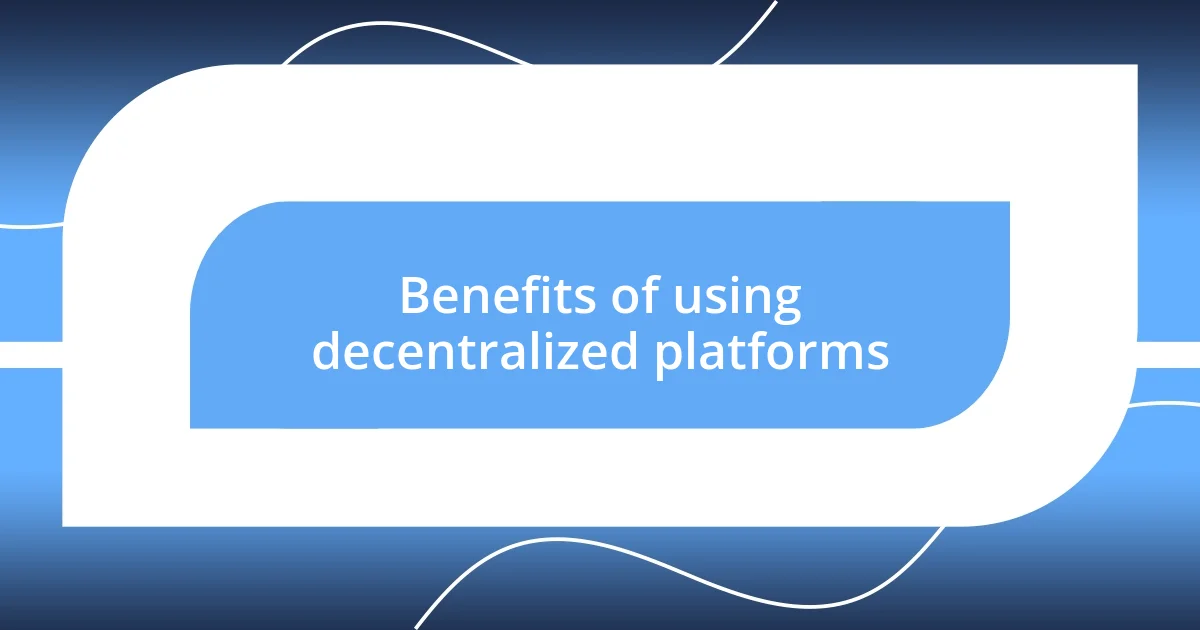
Benefits of using decentralized platforms
Utilizing decentralized platforms for events has brought several compelling benefits that I genuinely admire. One of the most significant advantages is the increase in participant empowerment. I recall a grassroots music festival where everyone had a say in the lineup and venue, creating an atmosphere of enthusiasm and investment. It felt amazing to be part of a decision-making process that was truly collective rather than dictated by a single organizer. This collective ownership not only boosted participant morale but also strengthened connections within the community.
Here are some standout benefits of using decentralized platforms:
- Enhanced Transparency: Event details, financial transactions, and decisions are openly shared, fostering trust among participants.
- Greater Accessibility: Anyone can join or contribute, breaking down barriers often imposed by centralized platforms.
- Collaborative Decision-Making: Participants are actively involved in shaping the event, leading to richer experiences.
- Improved Security: Utilizing blockchain ensures that data is secure and tamper-proof, offering peace of mind to all involved.
- Lower Costs: By removing intermediary fees, organizers can allocate resources more effectively, often resulting in lower ticket prices.
The way these benefits contribute to a more vibrant, engaged community resonates deeply with me. It’s a refreshing shift from traditional methods, creating a sense of belonging that lingers long after the event concludes.
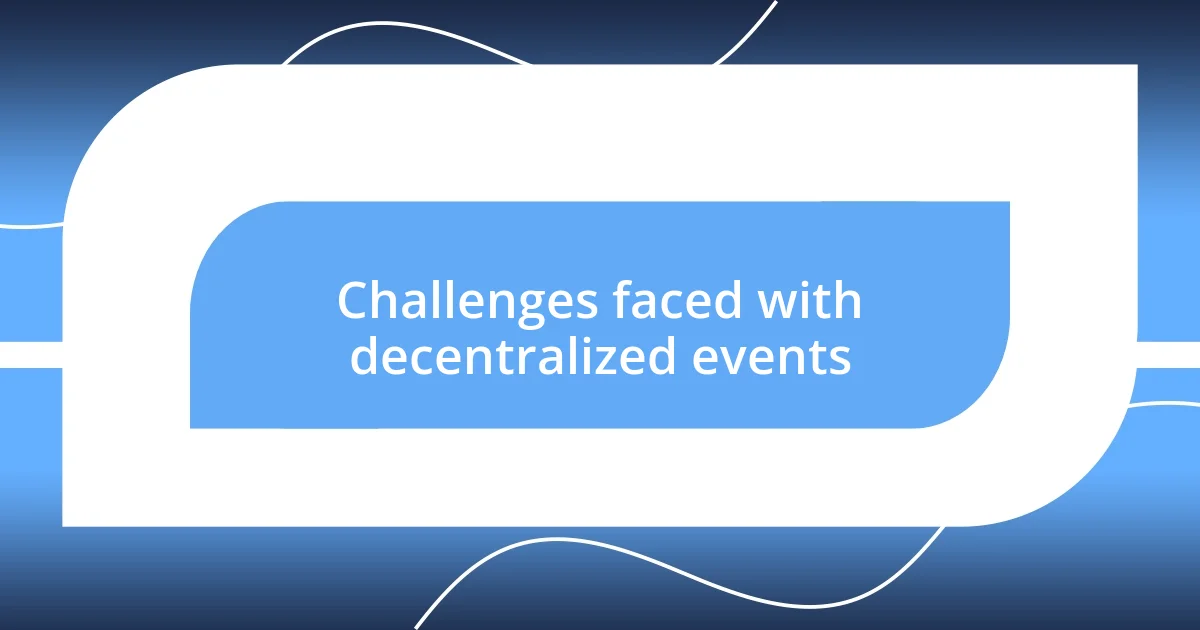
Challenges faced with decentralized events
One major challenge I encountered with decentralized events was the lack of established regulations. Without a central authority, navigating the legalities of organizing an event became quite overwhelming. I remember attending an event that faced compliance issues; it was disheartening to see the organizers scramble to sort out permits and adhering to local laws while the excitement of the event dimmed. Could a well-defined legal framework enhance the decentralized experience? I believe it could direct energies toward event creation rather than crisis management.
Additionally, technology can often be a double-edged sword in the decentralized realm. I witnessed firsthand at a tech-driven event how some attendees struggled to interact with the platform due to varying levels of digital literacy. It made me ponder the inclusivity of decentralized events; while they promise open access, is everyone truly equipped to participate? When technology becomes a barrier rather than a bridge, it erodes the very essence of community that decentralized platforms aim to foster.
Moreover, the volunteer-driven nature of many decentralized events can lead to inconsistent quality. I have experienced events where the enthusiasm of volunteers was palpable, yet the execution felt disorganized. It’s a fine line between empowering individuals and ensuring a smoothly run event. How can we strike a balance? Emphasizing training and coordination among volunteers could potentially elevate the quality while maintaining that empowering spirit.
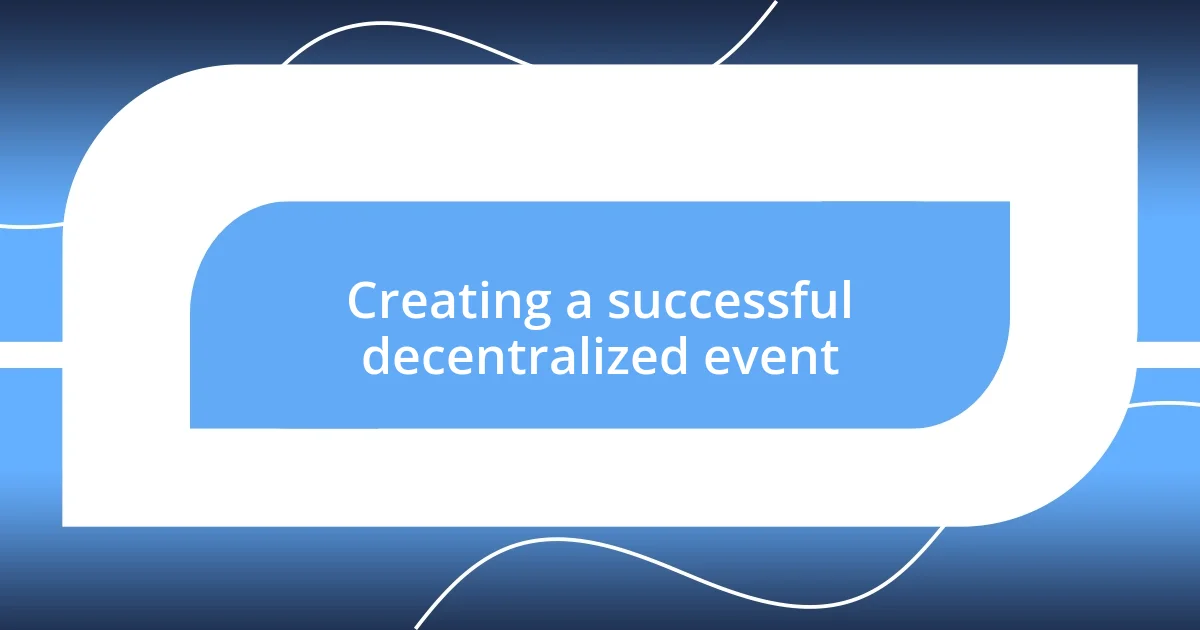
Creating a successful decentralized event
Creating a successful decentralized event hinges on clear communication and collaboration among all participants. I remember when I helped organize a local environmental summit using a decentralized platform. We created a shared online space for discussions, which allowed everyone to voice their ideas, concerns, and suggestions in real-time. This transparent dialogue led to a more dynamic agenda, true to the community’s values. Does it get any better than that? It’s incredibly empowering to see how collective input can shape an event in ways traditional planning often overlooks.
In my experience, setting up a robust framework for coordination is essential to tackle the inherent challenges of decentralization. For instance, during a community art fair, we utilized tools that allowed participants to propose workshops and collaborate on activities while keeping track of logistics seamlessly. However, I soon realized that while the technology can facilitate, it’s the relationships forged in those planning stages that really make the event shine. How often do we underestimate the power of connection amidst the technology? When everyone feels valued and integral to the process, the event transforms from a mere gathering into a celebration.
Moreover, embracing a culture of feedback is vital for future success. After hosting a decentralized event, I initiated an anonymous survey to gather input from attendees. I was surprised at the wealth of insights—some highlighted aspects we had overlooked, while others praised the agile approach we took. This willingness to adapt not only enhances the experience but also nurtures a sense of community that goes beyond the event itself. Isn’t it fascinating how creating a space for contribution can spark a ripple effect, inspiring participants to engage even more deeply next time?
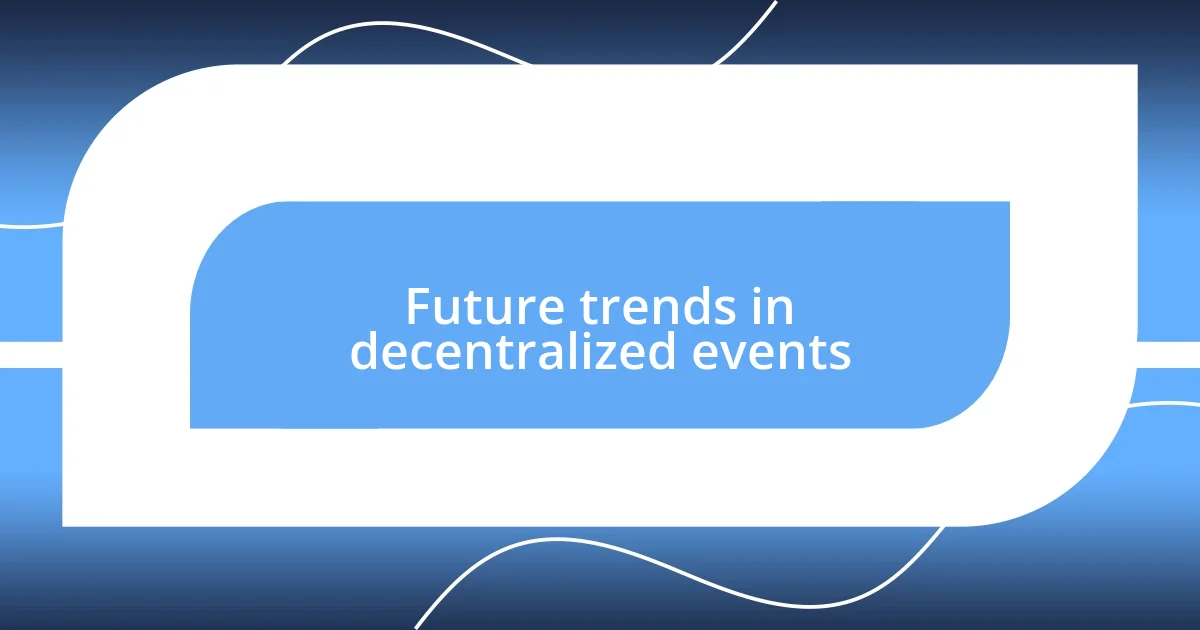
Future trends in decentralized events
The future of decentralized events promises a shift toward increased personalization and tailored experiences for attendees. I recall a recent virtual conference where participants could craft their own schedules, selecting topics that truly resonated with them. It was liberating to see how this level of autonomy not only enhanced engagement but created a vibrant atmosphere where connections flourished. Will we see more platforms adopting this model? I certainly hope so, as it reflects a shared value of individuality within a community context.
Another exciting trend is the integration of immersive technologies, like virtual reality and augmented reality, into decentralized events. I once attended a product launch that utilized AR to let participants experience the product in their own environments. It made me think—how will these technologies redefine our interactions during events? As more creators explore these tools, we can expect a richer tapestry of experiences that transport us beyond traditional event settings, fostering deeper connections among attendees, irrespective of their physical locations.
Collaboration across borders is set to become a defining characteristic of decentralized events. During a global meetup I facilitated, I marveled at the seamless dialogue spanning multiple time zones and cultures. It brought a unique flavor to our discussions—ideas flowed freely, transcending geographical limitations. Isn’t it exciting to anticipate more of these cross-cultural exchanges? I believe they hold the potential to spark innovation and foster understanding in ways that were previously unimaginable, enriching the decentralized event experience even further.









